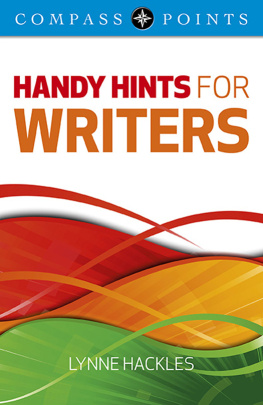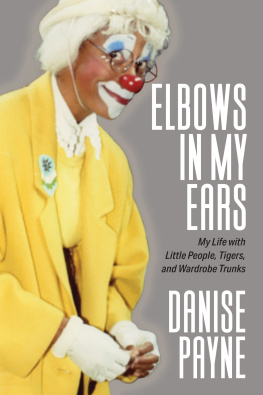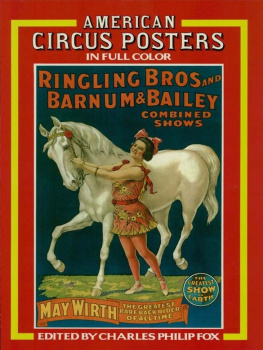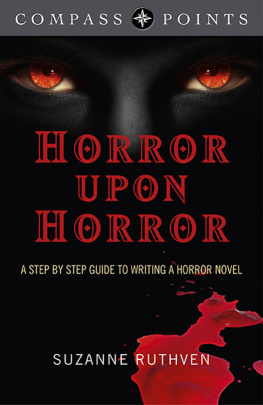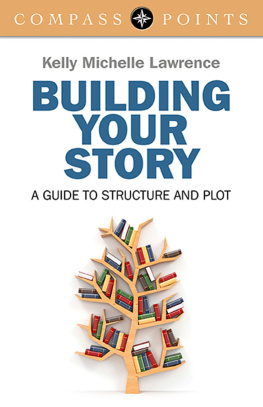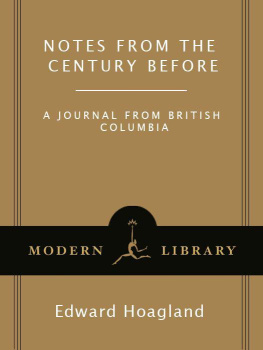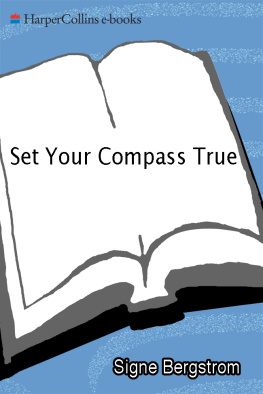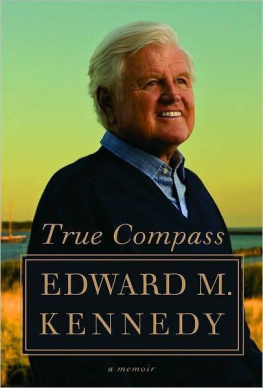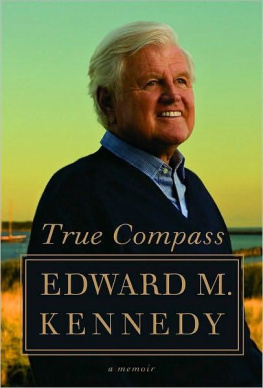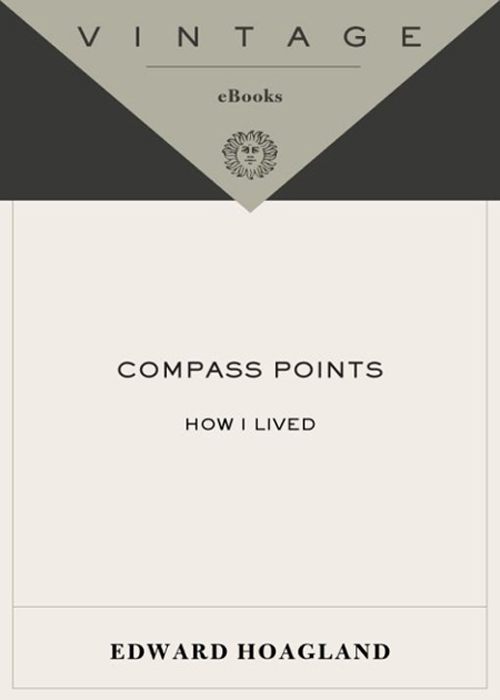
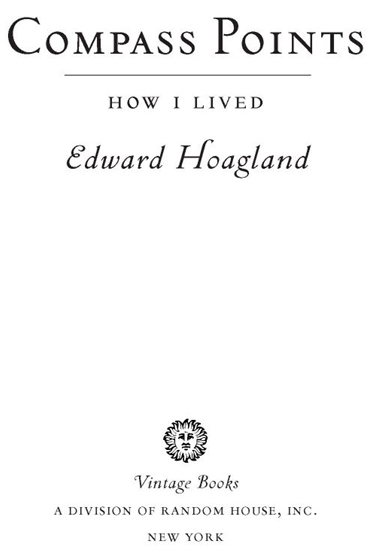
Table of Contents
For Marion Magid, and Steele Commager,
and Ross Wetzsteon, and Joe Flaherty, and Bob Towers,
and other friends who didnt live long enough
to write their own memoirs.
And to Trudy with love and gratitude.
Acclaim for Edward Hoaglands COMPASS POINTS
Edward Hoagland is excitingly smart. Everything he observes is interesting because his vivid care enlivens.... He is a witness; he is a writer of literature.
Annie Dillard
Above all, Hoaglands life, and writing, is about the necessity to observe and get it down while were here. He knows that we have the worlds ear so briefly that we had better make it count, and in this splendid volume, he does just that.
Minneapolis Star-Tribune
A busmans holiday memoir in the form of nearly a dozen sharp, intensely personal essays.... Hoaglands compelling, critical eye draws his reader in and captivates him.
Chicago Sun-Times
Hoaglands writing is second to no ones.
Robert Stone
[Compass Points] rings with Hoaglands barbaric yawp, his enduring enthusiasm for the American continent and the dreams it has inspired.
Seattle Weekly
Edward Hoagland reexamines his private geographies with freshly opened eyes.... His curiosity is omnivorous.
Mens Journal
Edward Hoagland is one of the finest essayists in English....The pleasures of this book... are considerable.
Ruminator Review
[Hoagland] strikes a quietly elegiac tone.... Lovers of fine prose will be delighted with this new volume.
Publishers Weekly
Compass Points, [Hoaglands] capstone achievement, reads like a cross between the cantankerous eloquence of Edward Abbey... and the intimate, gentle self-mockery of Phillip Lopate, with a pinch of Montaigne and Thoreau for contrarian measure.... Hoaglands sentences are those rare kind that are so self-contained, yet so joyous in their rhythms and surprising in their twists.
In These Times
IN THE COUNTRY OF THE BLIND
"The blind eat many a fly, says a fifteenth-century proverbfamiliar as recently as sixty years ago, when I was small and blind people were still all over, tap-tapping with their white canes and saddled with dark glasses. The cane, if waved peremptorily, with any luck brought traffic to a halt, and its rhythmic tapping could part a stream of pedestrians and function for the blind person like a kind of radar besides. Power and pathos: because dark glasses were not then an emblem of celebrity or of a fashionable alienation, but of the saddest, sharpest handicap. Ostensibly making it harder to see, they signified instead that the person couldnt see and probably had a face so wooden or profoundly wounded by loneliness that he or she preferred to go incognito. Common problems such as cataracts or glaucoma were not often reversible, whereas today you need to fly to Third World outposts to encounter blindness on such a scale.
This phenomenon of adults who were helpless and pitiable, though in the prime of life, became one of the first moral puzzles children recognized. Old age they knew; jailbirds they knew about; real freakslike the waterhead whom I once visited, painfully imprisoned in an easy chair in a dark cottage, his head bloated to double sizethey might also have some vague acquaintance with. But the blind were ordinary folk, innocent of any crime or grotesquerie, of no specific age, who lived in crabby or long-suffering perpetual night. A mean individual I knew used to snicker when he told me how he had snuck into a blind mans house when he was a boy (having watched him leave for his weekly tap-tap trip to the grocery store), and shat into the sink where all his dishes were. And I could hear the desolate groan the blind man must have uttered, coming home, smelling the evidence of what had been done to him and searching for where it was, while he fathomed his impossible position from now on, living alone, as the story spread among the children of the neighborhood.
In the 1950s, however, when I reached my twenties, certain types of people began to adopt dark glasses to convey a different message and as a form of chic. Jazz musicians, for example, could dramatize the underground, persecuted, jokey character of their existence and telegraph the idea that even at night they already knew too much about what was going on to want to see much more. Better for the spirit to be self-absorbed, ironically bemused, optionally blinda spade so savvy that he wore shades. Yet highway troopers, too, wore smoked glasses to mask their emotions and thus look formidably impassive as they delivered news as highly charged as jazz. And many of the newsworthy intellectuals of the era, caf-based Existentialists on both sides of the Atlantic, likewise affected sunglasses as a means of demonstrating that a great deal of the passing parade was better left unseen. Impelled by the atrocities of two vast wars, and signature books like Nausea and The Stranger, they seemed to advocate disguising your identity to forestall repercussions and limit what you let yourself take in of a corrupt, demoralizing world in which the night was better than the day because of what it screened.
I didnt agree with this, and didnt wear dark glasses. Believing in nature and an overshadowing beneficence even in its offshoot, human nature, I wanted to gorge on every waking sight. I loved the city like the countrythe hydrants that fountained during the summer like a splashing brookand wanted therefore to absorb the cruel along with the good. I knew that Americans had responded to the bloody ruination of the Civil War not in a fashion corresponding to Sartre or the theater of the absurd, but by turning west once again to seek the balm of the wild. And if in doing so they had gradually spoiled it, that eventuality was more through overpopulation than by greed or any other classic wickedness. I saw this because my own solution to a sad spell was also to head outdoors and climb a spruce, find a pond, or hitchhike west, where I achieved an acquaintance with the frontiers that were left. In the city, it was to seek the most crowded places, Coney Island, Union Square, the Lower East Side, Times Square, on the same instinctive principle that life in bulk is good. Embracing the fizz and seethe of a metropolis was safer then, as was hitchhiking, but my tropism to crowds has never changed. Rubbing shoulders with thousands of people, my spirits surge in the same way that I grin at seeing a one-year-old, or will approach someone elderly, optimistic at the prospect of talking with him. A basic faith kicks in. Its automatic, not ideological, though I believe life has meaning. I find diversity a comfort in the wilds and in the citythat there are more species than mine, more personalities than meand believe in God as embodied in the earth and in metropolises. I believe that life is good.
So, night or day, in Alaska or Africa, Bombay, Rome, Istanbul, New York, I never wore dark glasses. I can remember dazzling long wonderful days out in a boat in alligator refuges in Georgiabird sanctuaries in Texas or Louisianascouting with wildlife experts who had some protection for their eyes. But I wanted to see everything just as it really was, in the full spectrum of colors, as a bird or reptile would. In the desert looking for a mountain lion I was the same, and in Greenwich Village, at Andy Warhol parties, Id no more shade my eyes from the blitz of strobe lights than put in earplugs. I wrote for the purpose of being read in fifty years, and how could you describe a world whose colors you hadnt honestly seen?
Next page

